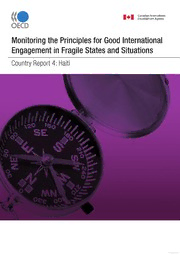Table Of Content1^1 CDaenvaedlioapnmeInntteArngaetniocnyal
OECD
Monitoringthe PrincipiesforGood International
Engagementin FragileStatesand Situations
CountryReport4:Haiti
MonitoringthePrinciplesforGoodInternationalEngagement
InFragileStatesandSituations
CountryReport4:Haiti
(TranslationfromoriginalversioninFrench)
I1d^ib1l CanadianInternational
OECD DevelopmentAgency
ORGANISATIONFORECONOMICCO-OPERATIONANDDEVELOPMENT
TheOECDisauniqueforumwherethegovernmentsof30democraciesworktogethertoaddress
theeconomic,socialandenvironmentalchallengesofglobalisation.TheOECDisalsoatthefore-
frontofeffortstounderstandandtohelpgovernmentsrespondtonewdevelopmentsandconcerns,
suchascorporategovernance,theinformationeconomyandthechallengesofanageingpopulation.
TheOrganisationprovidesasettingwheregovernmentscancomparepolicyexperiences,seek
answerstocommonproblems,identifygoodpracticeandworktoco-ordinatedomesticandinterna-
tionalpolicies.
TheOECDmembercountriesare:Australia,Austria,Belgium,Canada,theCzechRepubhc,
Denmark,Finland,France,Germany,Greece,HungaryIceland,Ireland,ItalyJapan,Korea,Luxembourg,
Mexico,theNetherlands,NewZealand,Norway,Poland,Portugal,theSlovakRepublic,Spain,Sweden,
Switzerland,TurkeytheUnitedKingdomandtheUnitedStates,TheCommissionoftheEuropean
CommunitiestakespartintheworkoftheOECD.
OECDPublishingdisseminateswidelytheresultsoftheOrganisation'sstatisticsgatheringand
researchoneconomic,socialandenvironmentalissues,aswellastheconventions,guidelinesand
standardsagreedbyitsmembers.
ThisworkispublishedontheresponsihihtyoftheSecretary-GeneraloftheOECD.Theopinions
expressedandargumentsemployedhereindonotnecessarilyreflecttheofficialviewsofthe
Organisationorofthegovernmentsofitsmembercountries.
©OECD2010
YoucancopydownloadorprintOECDcontentforyourownuse,andyoucanincludeexcerptsfromOECDpublications,
databasesandmultimediaproductsinyourowndocuments,presentations,blogs,websitesandteachingmaterials,providedthat
suitableacknowledgmentofOECDassourceandcopyrightownerisgiven.Allrequestsforpublicorcommercialuseandtransla-
tionrightsshouldbesubmittedtorights@oecd.org.Requestsforpermissiontophotocopyportionsofthismaterialforpublicor
commercialuseshallbeaddresseddirectlytotheCopyrightClearanceCenter(CCC)[email protected]
d’exploitationdudroitdecopie(CFC)[email protected].
MonitoringthePrinciplesforGoodInternationalEngagementinFragileStatesandSituations
Foreword
Afterthe12January2010earthquakewhichdevastatedPort-au-Prince,Haitineedsetfectiveinternationalsupport
morethanever.Butwhiistweneedanimmediateresponse,wemustnotlosesightofthechaliengeswewerefacing
beforetheearthquake.Thesepersistentchailengesinciudetheiackofjobsandeconomicopportunities,physicaland
foodinsecurity,politicalinstability,andalackofdialoguebetweentheeliteandordinarycitizens,particularlythosein
thecountryside.
Thisdisasterhasstruckablowtotheprogresswehadmadesince2006-thereformofthenationalpolice,the
gradualsecuringoftheCiteSoleilslum,theholdingofgeneralelections,bettermacroeconomicmanagement,
publicreformandaninfrastructureprogramme.However,wehavenochoicebuttopersistandmakefurther
progress.
HaitiiscommittedtomonitoringthePrinciplesforGoodInternationalEngagementinFragileStatesandSituations
launchedattheHigh-LevelForumonAidEffectivenessinAccrainSeptember2008.Thiscommitmentwasmade
duringanationalconsultationon20-21May2009whichbroughttogetherallechelonsofHaitiansocietyaswell
asinternationalpartners.Weareconvincedthatmonitoringtheseprincipleswill,overtime,improvedevelopment
effectivenessinHaiti.
Thelessonslearnedfromthisnationalconsultation,whicharesynthesisedinthisreport(writtenbeforethelatest
crisis),mustactaspointsofreferenceasweco-ordinateandimplementthesupportwereceive.ThePrinciplesof
GoodHumanitarianDonorshipadoptedin2003alsoremindusthathumanitarianaidmustcontributetolong-term
developmentandmustnotaffectpre-existingefforts.
Wemustputtheessentialchallengesidentifiedduringthenationalconsultationatthecentreoftherecoveryeffort.
Wehavemoretorebuildthanourhomes-wemustrebuildoursocietyandournetworks.Thisisanopportunityforus
to“buildbackbetter”:byreinforcingcapacities,bypromotingmutualaccountability,andbyresumingthedemocratic
andeconomictransitionthatwastakinggraduallyplacebeforedisasterstruck.Seizingthisopportunitywilldemand
strongpoliticalwillonourpart,aswellasthestableandsustainedsupportofinternationalpartners.
H.E.Mr.Jean-MaxBELLERIVE
PrimeMinister
MinisterofPlanningandExternalCo-operation
CountryReport4:Haiti
.
Acknowledgments
ThisreportispartoftheFragileStatesMonitoringSurvey,ohairedbyMrOlivierKAMITATUETSU,Ministerof
PlanningoftheDemocraticRepublicoftheCongo;andsupportedbytheInternationalNetworkonConflictand
Fragility(INCAF)oftheDevelopmentAssistanceCommitteeoftheOrganisationforEconomicCo-operationand
Development(OECD-DAC).Thisnetwork'smissionistoimprovetheeffectivenessofinternationalengagementin
fragilecountries(www.oecd.org/incaf).
ThisreportwasdrattedbyMrPierre-AntoineBRAUD(BridgingInternational),underthedirectionofMsJuanade
CATFIEU(OECD).Itisbasedonamulti-actorconsultationwhichtookplaceon20and21May2009inPort-au-Prince.
ItscheckingandcontirmationbythevariousstakeholderswascarriedoutbytheNationalCo-ordinator,MrYves
RobertJEAN,andinternationalfocalpoint,MrRobertsWADDLE(Canada).Thisreportthusrepresentstheanalysis
ofthemainstakeholdersinHaiti,ratherthanoftheauthorortheOECD.
Haitiacknowledgeswiththanksalltheparticipantsatthemulti-actorconsultation,aswellasMrJean-Philippe
BERNARDINI(UnitedNationsDevelopmentProgramme);MrFrancescoGOSETTIDlSTURMECK(EuropeanUnion);
MsMelanieBOULET,MrJeanCOUTURIER,MrAlexandreGUIMONDandMrDominiqueROSSETTI(Canadian
InternationalDevelopmentAgency);andMrJean-RobertSIMONISE,MsCarolineLEGROS,MrOGEandMrRichard
MATHELIER(consultationfacilitators)fortheircontributions.ThereportwastranslatedintoEnglishbyMsJuliette
LINDSAY.MsMariaZANDTcontributedstatisticaldata.ThetirstroundoftheFragileStatesMonitoringSurveyhas
generatedsixcountryreportsandoneglobalreport,availableonthesurveywebsite;www.oecd.org/fsprinciples.
Asecondroundwilltakeplacein2011-ifconditionspermit-andwillallowprogresstobemeasured.Allthe
resultswillbepresentedatthefourthHigh-LevelForumonAidEffectivenesstobeheldinSeoulin2011
ThisreportwasoriginallywritteninFrench.PleaserefertotheoriginalFrenchversionfortheofficialtext,whichhas
beenagreedbythevariousstakeholders.
4 MonitoringthePrinciplesforGoodInternationalEngagementinFragileStatesandSituations
Tableofcontents
Foreword 3
Executivesummarv 8
Part1:Commondiagnosis,princiolebyprinciole 14
Princiole1:TakecontextasthestartingDoint 14
Princiole2:Donoharm 15
Princiole3:Focusonstatebuildinoasthecentralobiective 17
Princiole4:Prioritiseorevention 19
Princiole5:Recognisethelinksbetweenpolitical,securityanddevelopmentobiectives 20
Principle6:Promotenon-discriminationasabasisforinclusiveandstablesocieties 21
Princiole7:Alignwithlocalorioritiesindifferentwavsindifferentcontexts 23
Princiole8:Agreeonoracticalco-ordinationmechanisms 25
Princiole9:Actfast...butstayengaged 27
Principle10:Avoidpocketsofexclusion 29
PartII:Priorityactions 30
Annexes
AnnexA.Princiolesforgoodinternationalengagementinfragilestatesandsituations 32
AnnexB.StatisticaldataoninternationalengagementinHaiti 35
AnnexC.Theco-ordinationoftechnicalandfinancialoartners 37
AnnexD.Bibliography 39
CountryReport4:Haiti I 5
2
Boxes
Box1.Co-ordinationatthesubnationallevel 24
Chart
Chart1.Distributionofgrossdomesticproductbysector 21
Chart2.Mappingoutpoverty:geographicaivariations 29
Chart3.Peacekeeping,officialdevelopmentassistanceandemergencyaid(Haiti,2007) 35
Chart4.Structureofsectorgroups 38
Tables
Table1.Participantsinthenationalconsultationandinterviewees 1
Table2.Useofnationalsystems(2007) 23
Table3,AidforHaiti(2005-2010) 27
Table4.Predictabilityofaid,2007 27
Table5.Commitmentsanddisbursementsbysectorofactivity(2007)(USDmillion) 35
Table6.PeacekeepingexpenditurescomparedtoODA(2000-07)(USDmillion) 36
Table7.ForeigninvestmentinHaitiandrealannualvariationaspercentage 36
MonitoringthePrinciplesforGooijInternationalEngagementinFragileStatesandSituations
Acronymsandabbreviations
CPA Countryprogrammableaid
DSNCRP Nationalgrowthandpovertyreductionstrategypaper
EVD DutchAgencyforInternationalBusinessandCooperation
FAES EconomicandSocialAssistanceFund
G11 GroupcomprisingtheEU,WorldBank,Inter-AmericanDevelopmentBank,InternationalMonetaryFund,
UnitedNations,Canada,Spain,France,theUnitedStates,Japanandarepresentative(rotatingevery
sixmonths)oftheABCcountries(Argentina,Brazil,Chile)
IDB Inter-AmericanDevelopmentBank
IHSI HaitianInstituteofStatisticsandInformation
IMF InternationalMonetaryFund
MARNDR MinistryofAgriculture,NaturalResourcesandRuralDevelopment
MINUSTAHUnitedNationsStabilizationMissioninHaiti
NGO Non-governmentalorganisation
OAS OrganizationofAmericanStates
OIF InternationalOrganisationofLaFrancophonie
ONPES NationalObservatoryofPovertyandSocialExclusion
PAPDA HaitianPlatformtoAdvocateforanAlternativeDevelopment
PEMFAR Publicexpendituremanagementandfinancialaccounfabilityreview
PIUs Projectimplementationunits
PNH HaitianNationalPolice
SCTICS Interministerialtechnicalco-ordinationandsectormonitoring
SRSG SpecialRepresentativeoftheUNSecretaryGeneral
TFPs Technicalandfinancialpartners
UCAONG Co-ordinationUnitforNGOs
ULCC Unitforthefightagainstcorruption
UNDAF UnitedNationsDevelopmentAssistanceFramework
UNDP UnitedNationsDevelopmentProgramme
USAID UnitedStatesAgencyforInternationalDevelopment
PIU Projectimplementationunit
WFP WorldFoodProgramme
CountryReport4:Haiti 7
Executivesummary
TheHaitiCountryReportreviewstheimplementationofthePrinciplesforGoodInternationalEngagementinFragile
StatesandSituations,twoyearsaftertheywereendorsedbyministersoftheOECDDevelopmentAssistance
Committee’s23membercountries.Italsoidentifiespriorityareasforimprovingthecollectiveimpactofinfernafional
engagement.
Thereportsummarisesadiscussionamong90stakeholdersrepresentingbothnationalandinternationalinstitutions,
complementedbyinterviewsanddatacollection(seeIntroduction).
Theimplementationoftheprincipleswillbereviewedagainin2011(conditionspermitting).
1.Mainissues
Principle1:Takecontextasthestartingpoint.
•Haitipresentsacomplexsetofdeep-seatedproblemsstemmingfromitscontextandhistory.Thesemust
betakenintoaccountinthedesignofinternationalinterventionsanddevelopmentprogrammes.While
tsthaekeHhaoiltdiearnscaognrteeexdtoinntdhieffiemrpeonrttawnacyes.ofTchoenrteexaturaeliumnpdoerrtsatnatnddiinvger,gdiinfgfeorpeinntiosntsakboethhoiwdiethrisnhHaavietiainntseorcpireettye-d
reflectingalegacyofdivisionsandexclusion-andbetweenHaitianandinternationalactors,whichhavesofar
preventedtheemergenceofacommonvisionforHaiti’sdevelopmentprioritiesandforthecountry’sdirection
andpaceofchange.
•Thesemultiplereadingsofcontext,combinedwithageneralfailuretotranslatecontextualanalysisinto
programmedesignandimplementation{e.g.onyouthemploymentandregionaldisparities),hasledtoalack
ofcoherenceininterventionstrategies.ThisisreflectedintheHaitianPovertyReductionStrategy(DSNCRP),
whichprovidesacommonvisionforHaiti’slong-termdevelopment,butdoesnothighlighttheimmediate
priorities.
•Stakeholdersagreedontwomainpoints:(1)theneedtoinvestinamorejoined-upunderstandingofthe
Haitiancontext,includingitschangingcharacter,acrossnationalandinternationalactors;and(2)theneed
totakegreateraccountofthelocalcontextindefiningprogrammesandprojects,inparticularinrelationtothe
securityagendaanddemocratictransition.
Principle2:Donoharm.
Theconsultationrecognisedtheroleofinternationalassistanceinstabilisingthecountry,butalsopointedtoseveral
unintendedeffectsofinternationalintervention:
•Aiddeiiveryandmodaiities.Therewasaconcernthattheheavyinternationalpresencemayunderminethe
capacityandlegitimacyofthestate,forexamplewhereinternationalagenciesseektointervenetooheavilyin
domesticpolicydebatesorestablishparallelprojectimplementationunits(PIUs)outsideofregulargovernment
control.Inaddition,themajordisparityinsalarylevelsbetweengovernmentandinternationalactorshasdrawn
skilledlabouroutofgovernment.
•Wideningdisparities.Thereissomeevidencethatdevelopmentaidhasbeenoverlyconcentratedincertain
geographicalareas(suchastheslumofCiteSoleil,whilemostruralareaswerethoughttobeunder-aided)and
incertainsectors(thesocialsectorstendtobefavouredovertheproductivesectors).
•Foodaid.Therewasdebateonwhethertheprovisionoffoodaidhasdivertedattentionfromtacklingthelonger
termcausesoffoodinsecurity,whichwouldrequireinvestinginagriculturaldevelopment.
MonitoringthePrinciplesforGoodInternationalEngagementinFragileStalesandSituations
Principle3:Focusonstatebuildingasthecentralobjective.
•Therewasfirmconsensusontheimportanceofstatebuilding,butalsosomedisagreementonhowtoputthis
principleintopractice.Itwasnotedthatinternationalsupportforinstitutionbuildinghasfocusedonlyon
selectedpartsoftheexecutive,withouttakingagovernment-widevieworincludingstate-society
relations.Therehasbeenatendencytoignorebroaderquestionsofpublicservicereform.Forexample,the
legacyofpatron-clientrelationsfromtheDuvaliererawasemphasisedasbeinganobstacletoestablishinga
moderncivilservice.Andfiscalreformwillberequiredtoensurethatgovernmentcapacitycanbeenhanced
andsustained.
•ThereformoftheHaitianNationalPolice(PNH)wascitedasanexampleofsuccessfulstatebuildingthathas
resultedinsignificantimprovementsinsecurity.Accordingtoarecentopinionpoll,70%ofHaitiansviewthe
policeasthemostreputablegovernmentinstitution.However,therewereconcernsthatsuchimprovements
havenotbenefitedallpartsofthecountry,andhavenotbeenmatchedbyastrengtheningofthejudicialsystem.
Internationalagencieshavebeenworkingwiththepolicefor14years,whilesupportforthejusticesystem
beganonlyinthepastyear.
•Theconsultationrevealedotherexamplesofalackofajoined-upapproachtostatebuilding.Someofthe
maingapsappeartobelackofdonorinterestinsupportingpoliticalparties,contrastingwithlarge-scale
internationalsupportforparliamentasawhole("aparliamentwithoutparliamentarians"');atendencytofocus
oncentralgovernmentattheexpenseoflocalgovernment;andthelackofinitiativestobridgethedisconnect
betweenHaitiancivilsocietyandgovernmentandtopromotedomesticaccountabilityandpartnershipsin
servicedelivery:thereis"aweaksocialcontract".
•Theproliferationofparallelprojectimplementationunitsoperatingoutsideofregulargovernment
structureswasviewedasbeingamajorhindrancetobuildinggovernmentcapacity,ownershipandlegitimacy.
However,reducingthenumberofPIUswilldependoninternationalactorsseeingprogressintackling
corruption.
Principle4:Prioritiseprevention.
•Therewasbroadagreementontheimportanceofthisprinciple,andrecognitionofthepositiveroleofinterna-
tionalsupportinstabilisingthecountryoverthepastfiveyears.However,thesituationremainsprecariousasa
resultofdirepoverty,theweaknessofthesocialcontractandtheriskoffurtherpoliticalinstability.Hence,itwill
beimportanttomaintainfocusonconflictpreventionevenassecurityconditionsimprove.
•Particularemphasiswasplacedontheneedforamoreholisticapproachtoconflictprevention
encompassingsocial,economicandenvironmentaldimensions:(i)Thisshouldbebasedonanintegrated
approachrecognisingthelinksbetweengoodgovernanceandsecurity,tacklingtheproblemofyouth
unemployment,andlimitingthesocialandhumanitarianimpactsofnaturaldisasters;(ii)Akeyelementinthe
conflictpreventionstrategywillbetostrengthennationalstakeholderdialoguetoimprovecommunicationand
mediatebetweeninterestgroups.
Principle5:Recognisethelinksbetweenpolitical,securityanddevelopmentobjectives.
Everyoneagreedontheimportanceoftheprinciple.Therewasparticularagreementontheneedforgreaterfocus
oninter-sectorapproacheslinkingdifferentministriestoachievegreaterimpact.
1Phrasesinitalicsandquotationsmarksarequotedverbatimfromthenationalconsultation.
CountryReport4:Haiti 9

